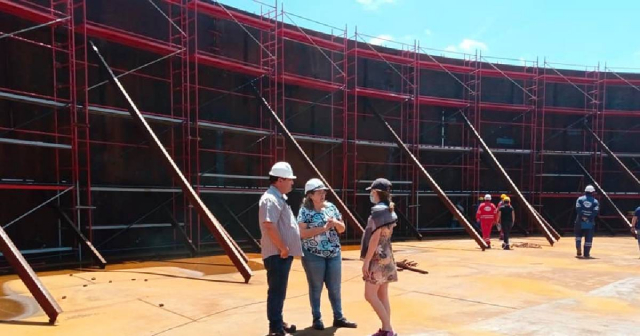Neighbors of the Cuban province of Mayabeque reported the first effects of environmental pollution generated by thelarge fire at the Matanzas Supertanker Base: "The cows don't want to eat the grass and the water is black."
In a video published on Twitter by the photographer and audiovisual producer Miriel Santana, two Cubans residing in the town of San Adrián, on the border of Mayabeque and Matanzas, said that the environmental impact there is already evident.
"Since yesterday a very large amount of water fell in the afternoon, and the animals no longer want to eat the grass, they chew, they chew, they throw it away and they don't want to eat it," commented one of the interviewees.
"We also have nowhere to give water to the animals, the rivers are completely contaminated with a black substance after it rained, the pastures are black, and the clothes that are hung out are collected with black soot that is no longer thrown away," he explained.
"Everything is like this, we don't know the animals, what we will do with them. A lot of smut that has contaminated the waters, the wells, everything," said the Cuban.
Similar situations have been reported in other towns on the island.Neighbors of the Yumurí Valley They told the newspaper Girón de Matanzas that after Sunday's rains the fall of black ash has damaged crops, and contaminated the water and the environment.
The farmer Enrique Viera García showed his pumpkin crops covered in a black and viscous substance that falls withpolluted rain.
His father-in-law, Diosdado Vera, 89, said they fear their animals will become poisoned and die because the water he offers them to drink is black.
The Versailles district of the city of Matanzas is also covered by smoke coming from the fire at the Supertanker Base, according to photos and videos shared by Santana himself on Twitter. He said that the "dense curtain of smoke is seen over Versailles," where "you can smell the smell of fuel."
Santana has taken a series of images and videos since the incident began this last Friday as a result of lightning, and which has now spread to four fuel tanks at the Matanzas refinery, making the situation uncontrollable for fire crews.
The Minister of Science, Technology and Environment of Cuba (CITMA), Elba Rosa Pérez Montoya, acknowledged this Tuesday that the incident has a "severe impact" on the environment, and that "there are approximately 3,200 particles in the air at this time" .
"The cloud (caused by the burning of crude fuel and fuel oil) has sulfur dioxide, nitrogen oxide, carbon monoxide, among other substances, which are falling on Matanzas, Mayabeque and Havana," he added.
He also explained that "these substances are four or five kilometers high," and that the problem is generated when they "descend with the rain."
The regime official, however, denied that "affects to human life" have been reported so far, although she recommended that Cubans in the west of the island maintain the use of face masks.
What do you think?
COMMENTFiled in:
